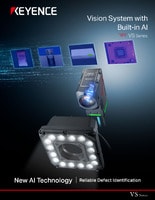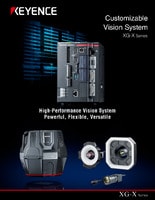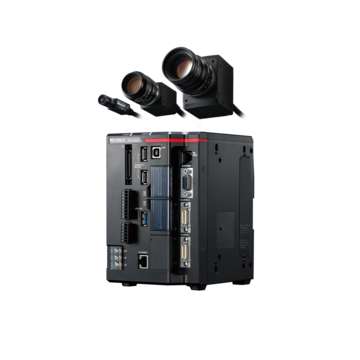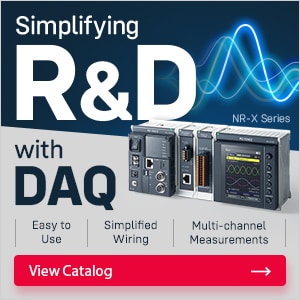Vision Systems
- Vision System with Built-in AI VS series
- Intuitive Vision System CV-X series
- Customizable Vision System XG-X series
- GigE camera and lighting for PC-based machine vision VJ series
- Inline 3D Inspection 3D Vision series
- 3D Vision-Guided Robotics 3D VGR series
- Line Scan Technology Line Scan series
- 2D Vision-Guided Robotics 2D VGR series
- LED Lighting CA-D series
- Lenses (for Machine Vision) CA-L series
- Machine Vision System Database VisionDatabase series
- 2D Measurement Inspection
- Optical Character Reading (OCR) and 1D/2D Code Verification
- Inline 3D Volume and Measurement Inspection
- Presence & Absence Inspection
- Flaw Detection
- 3D Vision-Guided Robotic Bin Picking
- High-Resolution Line Scan Cameras for High-Speed Imaging
- Automated Positioning and Alignment Systems Using Machine Vision
- Automotive
- Automation Equipment/Machine Building
- Electric Vehicles
- Medical Device Manufacturing
- Food/Beverage Packaging
- Semiconductor/Manufacturing Electronics
- Vision-Guided Robotics
- Solar
- Logistics
- Commodities
- Paper Manufacturing
- Machine Tools
- Electronic Device
- Printing
- Mining/Metals
- Fabric/Textile
- Tobacco
- Marine
- Aerospace
Vision Systems for the Solar Industry
Solar defect inspection systems have become indispensable tools in producing photovoltaic (PV) cells, modules, and the adjacent equipment found throughout the entire production chain. KEYENCE solar vision systems utilize high-resolution cameras, advanced lighting techniques, and intelligent algorithms. Accurately identify defects such as cracks, scratches, stains, and misalignments that could potentially impact the performance of the solar panel.
The VS Series is an AI vision system for the solar industry that improves defect detection, speeds up production, and enhances quality control. It optimizes workflows and reduces costs, maximizing efficiency.
We’re here to provide you with more details.
Reach out today!

Applications of Solar Vision Systems
Inspection of Solar Panel Components
Solar vision systems provide unparalleled precision and accuracy in the µm range, which ensures that the panels feature no defects.These solar vision inspection systems are extensively used in other quality control processes, like presence/absence detection, assembly verification, etc.
Quality Control in Solar Cell Manufacturing
Checking for cosmetic defects and functional performance before shipment can be a time-consuming process—implementing vision systems for the solar industry in your production process speeds up quality control.
Surface Defect Detection in Solar Panels
Traditional visual inspection methods rely on human operators to identify defects, which can be subjective and prone to error. Implementing vision systems for the solar industry eliminates this human error and provides more accurate and consistent results for surface defects on silicon wafers and solar cells that affect their efficiency.
Discover more about this product.
Click here to book your demo.

Introducing Our AI-Powered Vision System for the Solar Industry
As demand for renewable energy grows, solar panel production is scaling to meet global needs. However, maintaining quality and efficiency is a challenge. That’s where AI vision inspections in the solar industry can help.
Using advanced deep learning, our vision system quickly and accurately detects defects on solar panels, outperforming traditional inspections. It optimizes production, boosting efficiency and cutting costs from rework and recalls.
Key features of our vision system include:
- Multi-Format Compatibility: Easily adapts to a wide range of packaging types and sizes while maintaining optimal performance.
- Ease-of-use: The interface is intuitive, well-organized, and user-friendly, offering flexibility and ease of use.
- Adaptive Learning: Continuously enhances accuracy by leveraging new data and identifying patterns.
- High-Speed Processing: Efficiently processes large volumes of visual data, ensuring maximum production uptime.
Optimize your solar panel production with our AI-powered vision system. Contact us today!
Contact us to learn more about how our advanced technology can help take your business to the next level.
Contact Us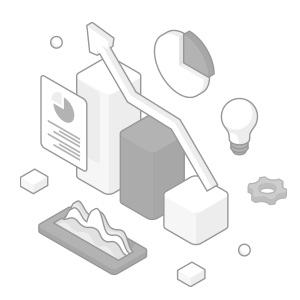
FAQs About Vision Systems in the Solar Industry
What Are the Benefits of Using Vision Systems in the Solar Industry?
Solar vision systems help reduce inspection time and speed up the production process by providing faster and error-free defect detection and insight into production data analysis. By enhancing quality control throughout the production process, vision systems for the solar industry prevent defective products from reaching further production. Thus, they minimize waste and rework costs.
What Types of Vision Systems Are Commonly Used in Solar Manufacturing?
The most commonly used types of vision systems in solar manufacturing include 2D/3D laser profilers, and Vision Systems with AI implementations.
What Challenges Do Vision Systems Help Address in the Solar Industry?
Manufacturing solar panels involves several complex processes and isn’t without its challenges, some of which include detecting defects on silicon wafers and solar cells, which affect their efficiency. This underscores the importance of early defect detection. They also help detect errors during production, which is crucial for identifying problems within the production chain.
How Do Vision Systems Support Traceability and Compliance Requirements in the Solar Industry?
Vision systems in the solar industry automate the tracking of serial numbers and barcodes, ensuring each panel's traceability throughout its lifecycle, crucial for compliance with global standards. Additionally, these systems conduct detailed inspections at every production stage, as well as documenting and archiving quality checks to satisfy regulatory requirements and support efficient defect management.
What Are the Primary Considerations When Selecting Vision Systems for the Solar Industry?
Selecting the right vision systems for the solar industry is mostly application-based. Understanding the specific tasks associated with your production will determine what kind of solar vision system your application might benefit from. The same applies to the type of solar vision system—either 2D or 3D vision system, resolution, image quality, processing speed, and integrability.
We’re here to provide you with more details.
Reach out today!

Related Downloads
Related Products
Applications
- 2D Measurement Inspection
- Optical Character Reading (OCR) and 1D/2D Code Verification
- Inline 3D Volume and Measurement Inspection
- Presence & Absence Inspection
- Flaw Detection
- 3D Vision-Guided Robotic Bin Picking
- High-Resolution Line Scan Cameras for High-Speed Imaging
- Automated Positioning and Alignment Systems Using Machine Vision
Industries
- Automotive
- Automation Equipment/Machine Building
- Electric Vehicles
- Medical Device Manufacturing
- Food/Beverage Packaging
- Semiconductor/Manufacturing Electronics
- Vision-Guided Robotics
- Solar
- Logistics
- Commodities
- Paper Manufacturing
- Machine Tools
- Electronic Device
- Printing
- Mining/Metals
- Fabric/Textile
- Tobacco
- Marine
- Aerospace

